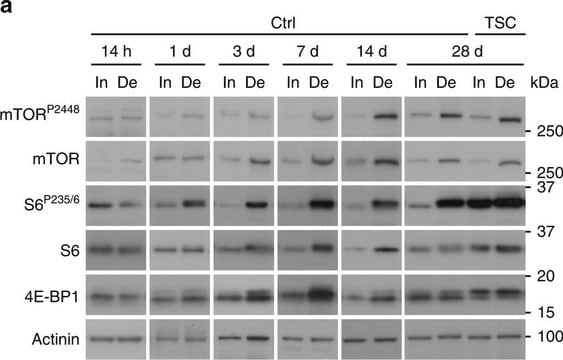A9776
α-Actinin from chicken gizzard
~80% α-actinin basis (SDS-PAGE), ammonium sulfate suspension
About This Item
Recommended Products
biological source
chicken gizzard
Assay
~80% α-actinin basis (SDS-PAGE)
form
ammonium sulfate suspension
mol wt
100 kDa
storage temp.
2-8°C
Gene Information
chicken ... ACTN2(396263) , ACTN4(396024) , RCJMB04_23c5(373918)
human ... ACTN1(87)
mouse ... ACTN1(109711)
rat ... ACTN1(81634)
General description
Application
- as an antigen to coat plates for the capture of anti-actinin antibody using enzyme-linked immunosorbent assay (ELISA) from tumor cell line clones
- in in vitro motility experiments to test its effect on actin filament movement
- to coat cantilevers for strengthening fluorescently labeled actin filaments in force measurement studies
Biochem/physiol Actions
Packaging
Physical form
Preparation Note
Prepared using a modification of the procedure of Neidel, J.E. and Cuatrecasas, P., Biochem. Biophys. Res. Commun., 91, 152 (1979).
Storage Class Code
10 - Combustible liquids
WGK
WGK 3
Flash Point(F)
Not applicable
Flash Point(C)
Not applicable
Personal Protective Equipment
Certificates of Analysis (COA)
Search for Certificates of Analysis (COA) by entering the products Lot/Batch Number. Lot and Batch Numbers can be found on a product’s label following the words ‘Lot’ or ‘Batch’.
Already Own This Product?
Find documentation for the products that you have recently purchased in the Document Library.
Our team of scientists has experience in all areas of research including Life Science, Material Science, Chemical Synthesis, Chromatography, Analytical and many others.
Contact Technical Service







